Introduction to Cat Dental Care
Dental care is an essential aspect of your cat’s overall health. Just as you would take your cat for routine veterinary check-ups, it’s crucial to include dental care in your regular care routine. Neglecting dental health can lead to various problems that not only affect the mouth but can also influence your cat’s general well-being.
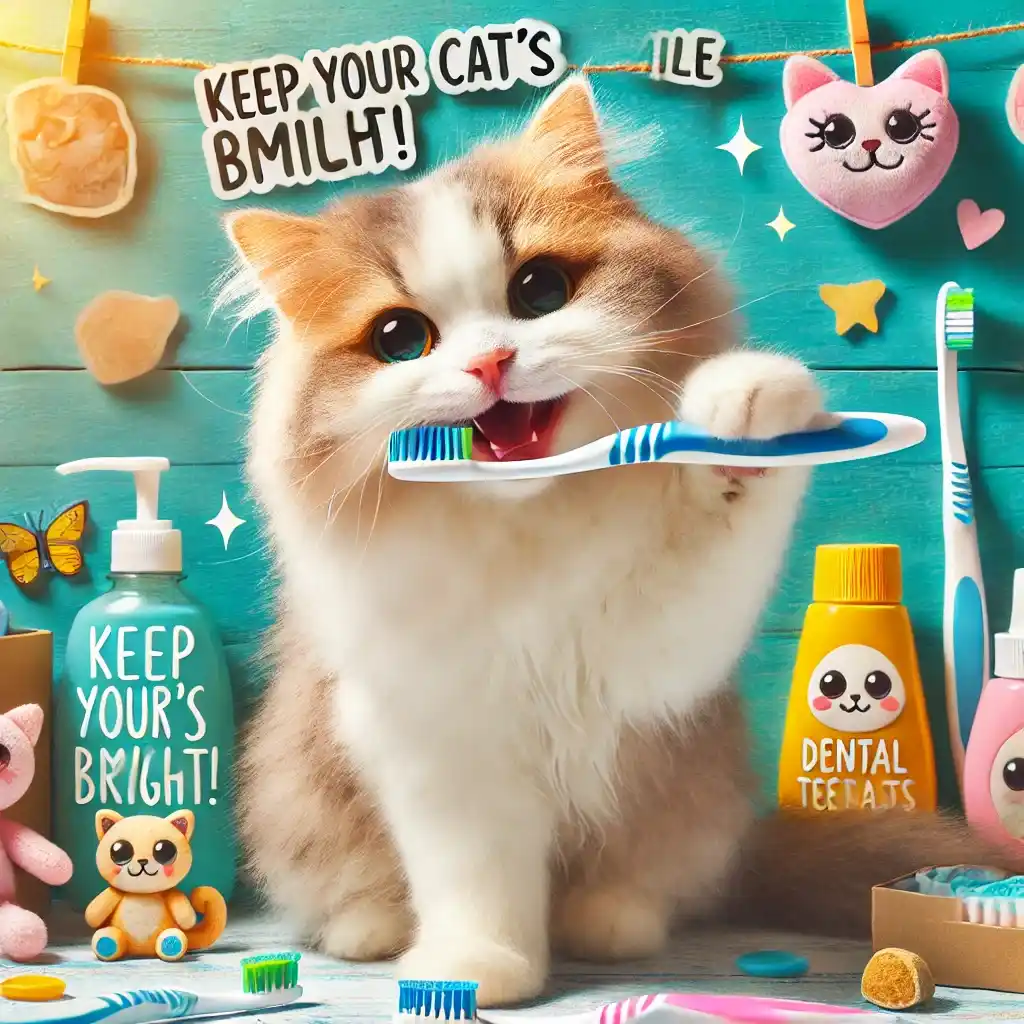
Importance of Dental Health
The importance of dental health for cats cannot be overstated. Cats, like humans, can develop dental diseases that can cause significant discomfort and pain. Dental problems can lead to infections that may affect other organs, including the heart and kidneys. Regular dental care helps to prevent these issues and can prolong your cat’s life.
Regularly maintaining your cat’s dental health can also improve their quality of life. Cats with healthy teeth are more likely to eat well, play actively, and display their usual playful behaviors. Moreover, proper dental hygiene can prevent bad breath, which is often a concern for pet owners.
Overview of Common Dental Issues
Understanding common dental issues that affect cats can help you take proactive measures. Some of these issues include:
- Periodontal Disease: This is one of the most common dental problems in cats, characterized by inflammation and infection of the gums. It often starts with Plaque, a viscous layer comprised of bacteria, that adheres to the surfaces of teeth, creating a breeding ground for dental issues.
- Tooth Resorption: This painful condition involves the breakdown of a cat’s teeth. The cause is not well understood, but it is thought to be related to dental plaque and possibly a diet high in certain nutrients.
- Plaque and Tartar Buildup: Plaque is a sticky film of bacteria that forms on teeth. If not removed through regular brushing, it can harden into tartar, which requires professional cleaning to remove.
Being aware of these issues can help you recognize early signs and get your cat the treatment they need promptly.
Understanding Your Cat’s Teeth
Anatomy of Cat Teeth
Cats have a unique set of teeth that are specifically adapted for their carnivorous diet. Understanding the anatomy of their teeth can help you appreciate their dental needs.
- Incisors are the small, frontmost teeth in the mouth, specialized for cutting and biting food. Cats use their incisors to nibble and groom themselves and grasp small prey.
- Canines: The long, pointed canines are crucial for catching and holding onto prey. They also play a role in tearing food.
- Premolars and Molars: Located at the back of the mouth, these teeth are designed for grinding and chewing.Incisors facilitate the breakdown of food, aiding in the digestion process by making it easier to chew
Knowing the function of each type of tooth can assist you in understanding your cat’s dietary needs and the importance of dental care.
Dental Development in Cats
From the moment they are born, kittens begin a process of dental development that is vital for their future health.
- Kittens: Kittens are born without teeth. They will start to develop their baby teeth around three weeks of age. These teeth are considered transitional and will ultimately be replaced by permanent ones as a child grows
- Adult Teeth: By the time they reach six months, kittens usually have their adult teeth. It’s important to monitor the transition, as some dental problems can arise if baby teeth do not fall out correctly.
Proper dental care during this developmental phase is essential. Starting a dental hygiene routine early can make it easier to maintain your cat’s dental health throughout their life.
Signs of Dental Problems in Cats
Recognizing Symptoms
Being vigilant about your cat’s dental health means knowing what to look for when assessing their oral hygiene. Some common signs of dental problems include:
- Bad Breath: While some level of odor is normal, foul-smelling breath can indicate dental disease.
- Difficulty Eating: If your cat hesitates to eat or avoids hard food, it might be due to dental pain.
- Excessive Drooling: Increased salivation can be a sign of oral discomfort or disease.
- Swollen or Bleeding Gums: Healthy gums should be pink, not red or swollen. If you notice bleeding or inflammation, it’s time for a vet visit.
- Loose or Missing Teeth: Any loose teeth or gaps in your cat’s mouth are cause for concern and should be evaluated by a veterinarian.
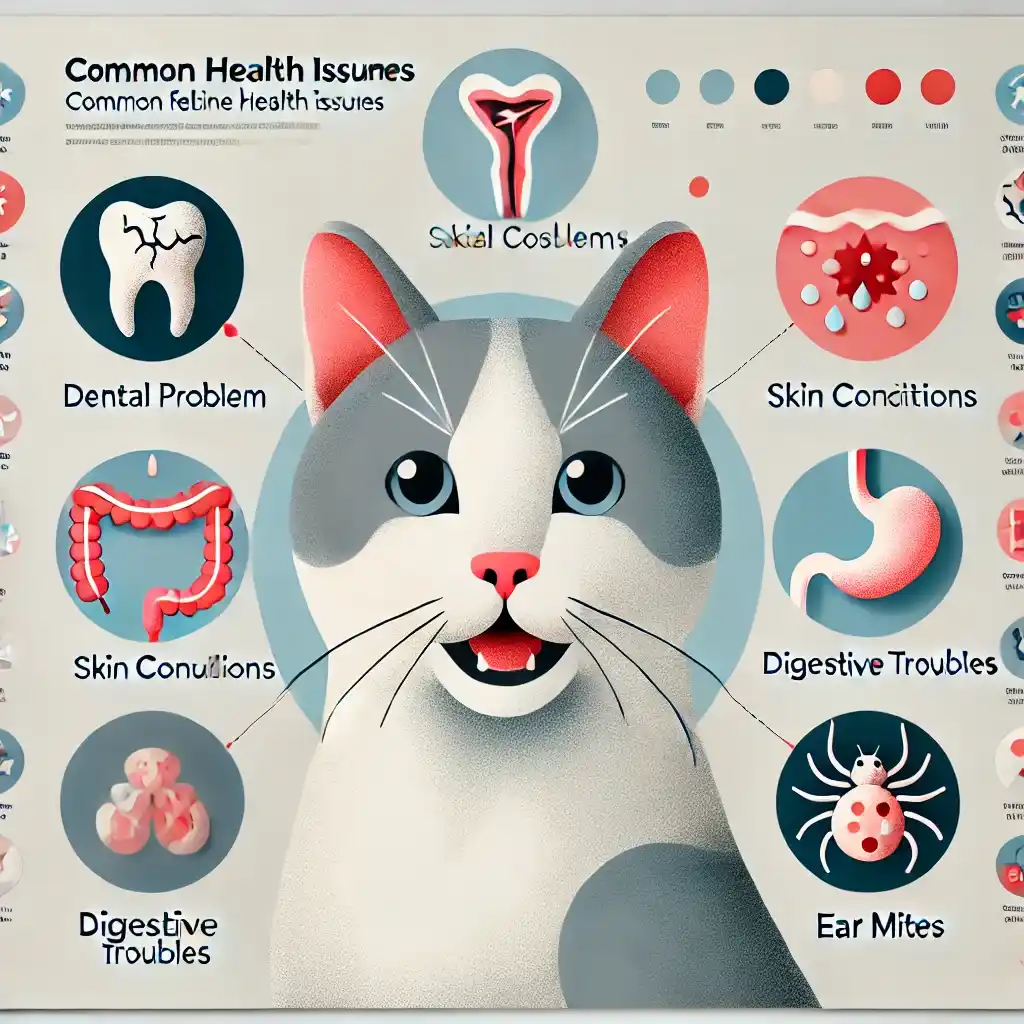
Recognizing these symptoms early can make a significant difference in your cat’s dental health and overall well-being.
When to See the Vet
If you observe any of these symptoms, schedule a visit with your veterinarian as soon as possible. Regular dental check-ups are essential even if your cat seems healthy. Your vet can perform a thorough examination and recommend appropriate dental care tailored to your cat’s needs.
Daily Dental Care Routine
Brushing Your Cat’s Teeth
Establishing a daily dental care routine is one of the best ways to maintain your cat’s dental health.
- Frequency: Aim to brush your cat’s teeth at least two to three times a week. Daily brushing is ideal for optimal dental hygiene.
- Technique: Use gentle circular motions to brush the outer surfaces of the teeth. Be careful not to apply too much pressure, as this can hurt your cat.
- Getting Started: If your cat is not used to having their teeth brushed, introduce the process gradually. Start by letting them sniff the toothbrush and taste the toothpaste. Once they’re comfortable, gradually introduce brushing.
Choosing the Right Toothbrush and Toothpaste
Choosing the right tools is crucial for effective dental care.
- Toothbrush: Look for a toothbrush specifically designed for cats. These often have softer bristles and smaller heads for easier maneuvering.
- Toothpaste: Never use human toothpaste, as it can contain ingredients that are toxic to cats. Instead, choose a toothpaste formulated for pets, which comes in flavors cats usually enjoy, such as chicken or fish.
Dental Treats and Chews
Benefits of Dental Treats
Incorporating dental treats into your cat’s routine can provide additional benefits.
- Plaque Control: Dental treats help reduce plaque and tartar buildup while allowing your cat to indulge in a tasty reward.
- Encouragement: Offering dental treats can encourage regular chewing, which naturally helps clean the teeth.
Recommended Products
When selecting dental treats, look for those that are endorsed by veterinary dental organizations. Some popular options include:
- Greenies Feline Dental Treats: These treats are specially designed to clean teeth and freshen breath.
- Purina Pro Plan Dental Crunch: Known for their dental benefits, these treats also provide balanced nutrition.
- Whiskas Dentabites: These are popular for their crunchy texture, which helps to reduce plaque while your cat enjoys a tasty snack.
Professional Dental Cleanings
Importance of Regular Vet Check-ups
Routine veterinary visits are crucial for ensuring the dental well-being of your cat, as they allow for professional cleanings and the early detection of potential dental issues
Frequency: Most vets recommend an annual dental check-up, but your cat may need more frequent visits if they have existing dental issues.
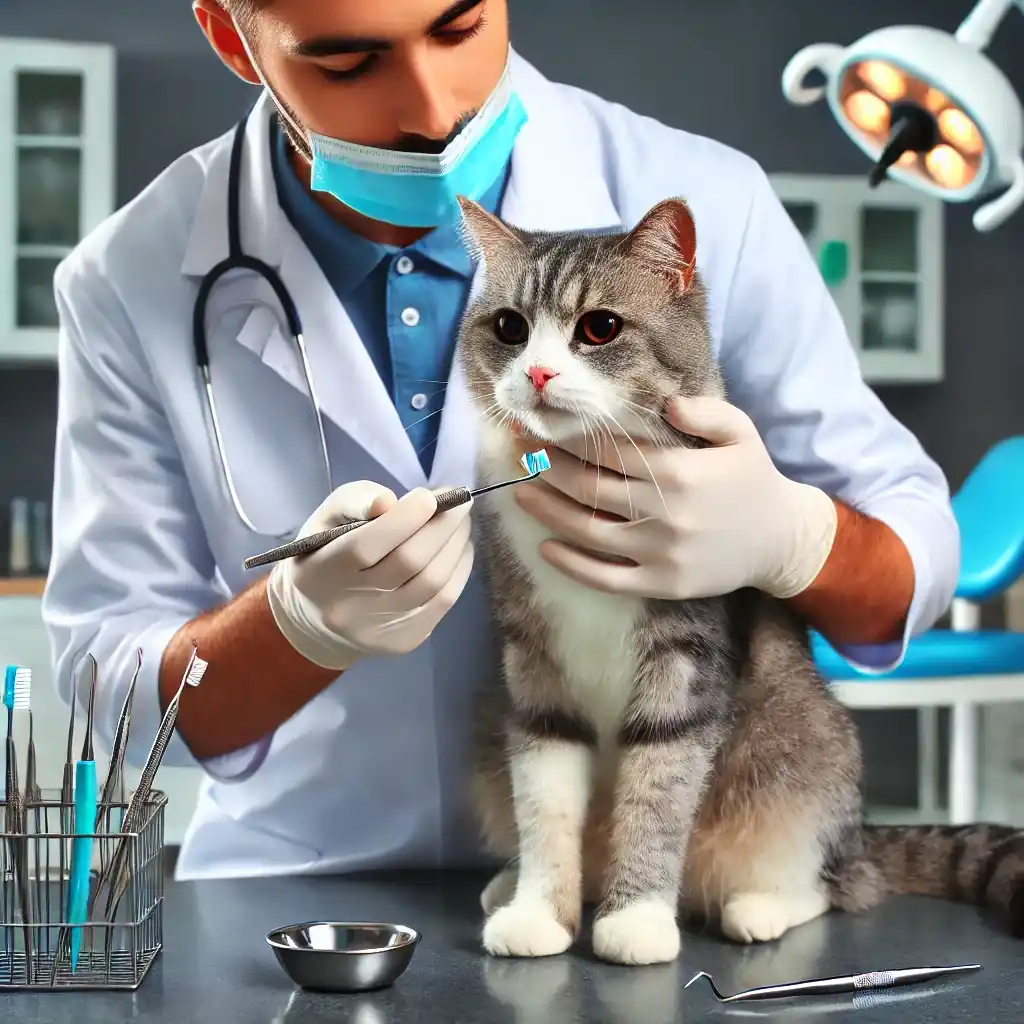
What to Expect During a Dental Cleaning
During a dental cleaning, your cat will be placed under anesthesia to ensure their comfort. The veterinarian will:
- Examine: Conduct a thorough examination of your cat’s mouth to assess dental health.
- Clean: Use special tools to remove plaque and tartar from the teeth and below the gum line.
- Treat: If any dental issues are found, your vet will recommend appropriate treatment, which may include extractions or other dental procedures.
Homemade Dental Care Solutions
Natural Remedies for Cat Dental Health
In addition to regular brushing and dental treats, consider incorporating some natural remedies into your cat’s dental care routine.
- Coconut Oil: Known for its antibacterial properties, coconut oil can help reduce plaque buildup. You can rub a small amount on your cat’s teeth during brushing.
- Raw Vegetables: Chewing on raw carrots or apple slices can provide a natural way to help clean your cat’s teeth.
DIY Dental Treat Recipes
Making your own dental treats at home is a fun and rewarding way to contribute to your cat’s dental health. Here’s a simple recipe you can try:
Homemade Cat Dental Treats:
- Ingredients:
- 1 cup whole wheat flour
- 1/4 cup cornmeal
- 1/4 cup catnip
- 1/4 cup chicken or beef broth
- Water as needed
Instructions:
- Preheat your oven to 350°F (175°C).
- Combine the flour, cornmeal, and catnip in a mixing bowl.
- Gradually add the broth and mix until a dough forms.
- Roll out the dough on a floured surface and cut it into small shapes.
- Place the shapes on a baking sheet and bake for 15-20 minutes or until firm.
- Let the treats cool before serving them to your cat.
These homemade treats not only help with dental hygiene but also provide a healthy snack for your pet.
Diet and Dental Health
Best Foods for Healthy Teeth
Feeding your cat a balanced diet is crucial for their dental health. Look for high-quality cat food that promotes dental hygiene.
- Kibble vs. Wet Food: Kibble is generally better for dental health as its crunchy texture helps scrape off plaque during chewing. However, a balanced diet should include both kibble and wet food for overall nutrition.
- Specific Formulas: Some cat foods are specifically designed to support dental health, featuring larger kibble sizes that help reduce plaque buildup.
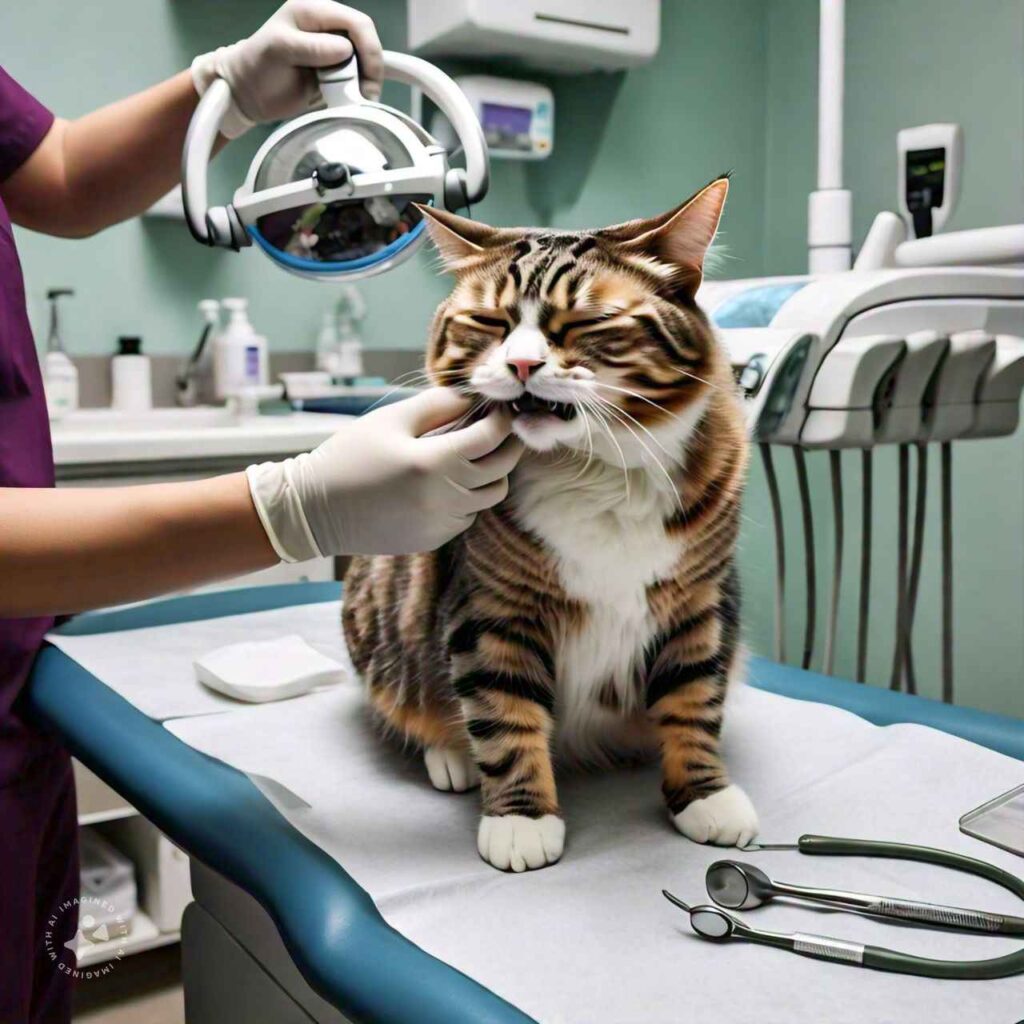
Foods to Avoid for Dental Care
While providing nutritious food is essential, it’s equally important to avoid certain types of food that can harm dental health.
- Soft Foods: Soft, sticky foods can lead to plaque buildup and should be limited in your cat’s diet.
- Sugary Treats: Foods high in sugar can contribute to dental issues. Instead, opt for treats that promote dental health.
Behavioral Tips for Easier Dental Care
Training Your Cat for Teeth Cleaning
Getting your cat used to dental care may take some time, but with patience and practice, it can become part of their routine.
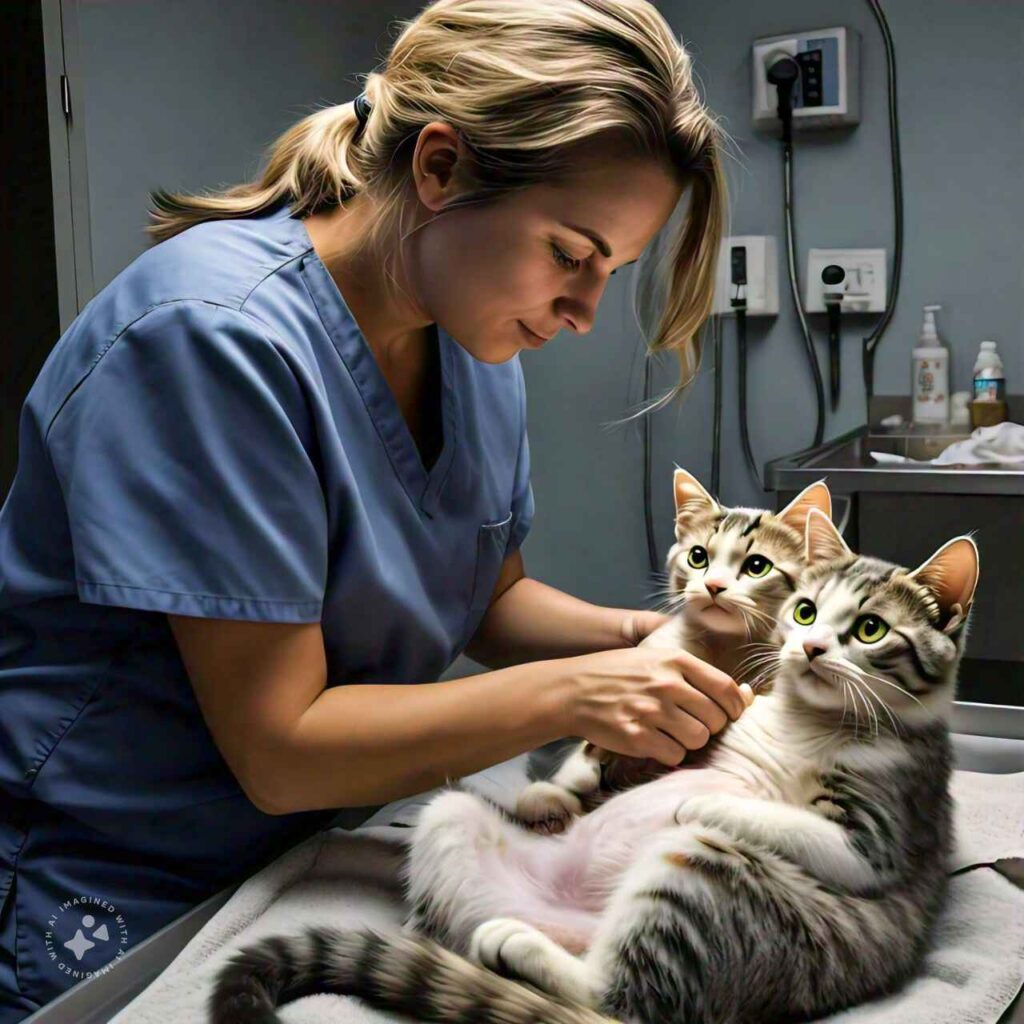

- Start Young: If you have a kitten, introduce dental care early to establish a routine.
- Use Positive Reinforcement: Reward your cat with treats or praise during and after brushing to create a positive association with dental care.
Making Dental Care a Positive Experience
Ensuring that dental care is a stress-free experience is crucial for both you and your cat.
- Be Gentle: Use a calm and gentle approach when handling your cat’s mouth.
- Create a Comfortable Environment: Choose a quiet space free from distractions where your cat feels comfortable and safe during brushing.
Professional Cleaning Process
| Step | Description |
|---|---|
| Initial Examination | Vet checks teeth and gums for health issues. |
| Anesthesia | Ensures comfort during cleaning. |
| Scaling | Removal of plaque and tartar buildup. |
| Polishing | Smoothens teeth to prevent future buildup. |
| Post-Cleaning Care | Recommendations for at-home care |
FAQs
Why is dental care important for cats?
Dental care is crucial for cats as it helps prevent periodontal disease, tooth loss, and serious health issues. Healthy teeth contribute to overall well-being, allowing cats to eat comfortably and enjoy a better quality of life.
What are common signs of dental problems?
Common signs include bad breath, difficulty eating, excessive drooling, swollen or bleeding gums, and loose teeth. Noticing these symptoms early can help address potential dental issues promptly.
How often should I brush my cat’s teeth?
It’s recommended to brush your cat’s teeth at least two to three times a week. Daily brushing is ideal for optimal dental hygiene and helps prevent plaque buildup.
What are some effective dental treats for cats?
Effective dental treats include Greenies Feline Dental Treats, Purina Pro Plan Dental Crunch, and Whiskas Dentabites. These treats help reduce plaque and tartar while also being enjoyable for cats.
When should I take my cat for a professional dental cleaning?
Schedule professional dental cleanings at least once a year, or more frequently if your cat shows signs of dental issues. Regular vet check-ups are essential for maintaining good dental health
Conclusion
Maintaining your cat’s dental health is essential for their overall well-being. By following these tips for best cat dental care, you can help ensure that your cat has healthy teeth and gums for life. Regular dental check-ups, proper home care, and a balanced diet will all contribute to your cat’s happiness and health.
Investing time in your cat’s dental care can lead to a happier, healthier life for your feline friend. Remember that a little effort goes a long way in preventing dental diseases and ensuring your cat enjoys many years of good health
